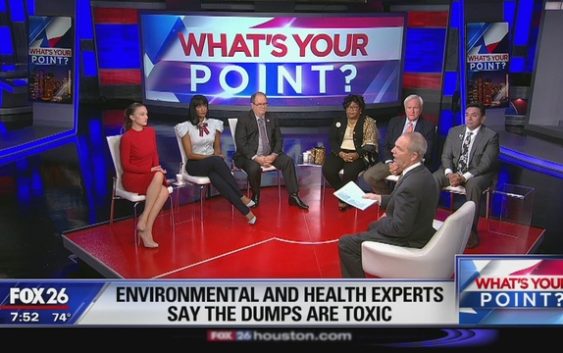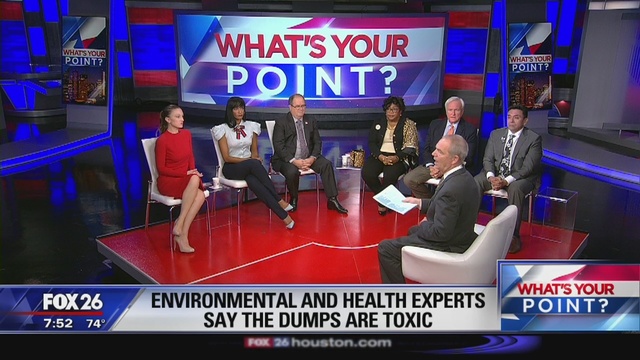- EF-1 tornadoes ripped through Cypress, Waller County areas with winds at more than 100 mph, NWS reports
- Houston-area storm damage updates: Clean up continues after NWS says two EF-1 tornadoes and powerful derecho ripped through SE Texas
- Low risk of damaging winds, hail from Saturday storms
- EF 1 tornadoes ripped through Cypress, Waller County areas at more than 100 mph, NWS reports
- Caddo Mounds State Historic Site to celebrate new visitor center, traditional grass house after 2019 tornado
From sewage to Dioxin our polluted waterways


HOUSTON (FOX 26) – From leaking sewage to sludge pits full of dioxin and other chemicals Houston’s water is the focus of discussion.
This week’s panel: Jessica Colon – Republican strategist, Nyanza Moore – progressive commentator and Houston attorney, Bob Price – Associate Editor Breitbart Texas, Tony Diaz- Chicano educator and activist, Tomaro Bell – Super Neighborhood leader, Bill King – businessman, columnist and former Kemah Mayor.
Bayou City Waterkeeper Files Lawsuit against the City of Houston
On Friday, September 21,2018 a non profit organization filed a lawsuit against the City of Houston for thousands of Clean Water Act violations. Here is the press release posted on their website
HOUSTON, TX – Bayou City Waterkeeper filed suit against the City of Houston in the U.S. District Court for the Southern District of Texas in Houston for over 9,300 potential Clean Water Act violations on Friday, 21 September 2018. For at least the last five years, the City has failed to comply with its permits by allowing raw or partially treated sewage to be discharged from its wastewater treatment and collection systems into our public waterways throughout the Houston area.
The City of Houston has long been aware of its Sanitary Sewage Overflows (SSO) and bypass problems, yet has failed to eliminate, or significantly reduce, them from its wastewater system. Over the last five years, the City has self-reported more than 9,300 discharges of untreated wastewater in violation of its water quality permits. Untreated wastewater can contain bacteria, viruses, and other pollutants that can impact public health and cause property damage. Bypass and SSO discharges like the City’s contaminate waterbodies and cause serious water quality problems.
“While the sheer number of spills is jaw-dropping, each spill potentially poses significant risk to the health and safety of our communities,” said Jordan Macha, Bayou City Waterkeeper Executive Director and Waterkeeper. “For years, the City has known about their SSO problem but failed to take action to fully address it. This breach of the public trust endangers our health and our ability to safely enjoy our bayous, creeks, and streams.”
In 2005, the City entered into a Compliance Agreement with the Texas Commission on Environmental Quality to address some of its longstanding wastewater disposal problems. Under that Agreement, the City reportedly upgraded, cleaned, and renewed some of its sewer pipes and infrastructure. Unfortunately, as evidenced by the City’s continuing violations, the work undertaken under the 2005 Agreement falls far short of resolving the City’s problem.
On July 23rd, Bayou City Waterkeeper served the City with a 60-day Notice of Intent to Sue. Since July, the City of Houston has continued to report SSOs and exceed pollution discharge limits allowed by their permits. “The scope of the City’s legal violations is limited by the fact that all the data is self-reported,” notes Lauren Ice, an attorney with Frederick, Perales, Allmon & Rockwell, P.C. representing Bayou City Waterkeeper. “The City’s problem could be even more severe than our research has revealed considering gaps in the data and the apparent underreporting of the full quantity of untreated sewage being discharged.”
Human fecal waste in SSOs, along with animal fecal waste in stormwater runoff, are the primary causes for bacteria pollution in Houston’s creeks and bayous. “Houston has the worst natural water quality in the state, and constant sewage overflows are a big reason why,” notes Brian Zabcik, Clean Water Advocate at Environment Texas Research & Policy Center. The member-based nonprofit group recently released “Swim At Your Own Risk,” an analysis of Texas water quality testing data. “While 49% of all freshwater locations statewide had unsafe levels of fecal bacteria on at least one testing day last year, bacteria levels were too high for swimming or other human contact at 96% of testing sites in Houston.”
“Through this lawsuit, Bayou City Waterkeeper aims to improve both water quality and quality of life for local residents for decades to come by forcing the City to comply with its obligations under the Clean Water Act and finally resolve its longstanding SSO problems,” says Kristen Schlemmer, Legal Director for Bayou City Waterkeeper. “At the center of any resolution must be Houston’s residents, particularly in low-income communities who historically have borne the brunt of the City’s SSO problem.”
A copy of the lawsuit is available here: Bayou City Waterkeeper v. City of Houston
WEST BAY WASTER PITS
It has been more than a year since FOX 26 News revealed what some now call “the most thoroughly toxic strip of land on the Texas Gulf Coast.”
Blocked from public view by a levee, just feet from the Intracoastal Waterway and Galveston Bay, a string of giant sludge pits, most more than a half century old, each filled to the brim with waste no living thing should ever touch.
“Right now as I am doing this interview, my kidneys are one point away from failure,” said Jennifer Guy, a Hitchcock resident and critic of the pits. “I am sterile and I am legally blind.”
For all of her 39 years, Guy has lived within a few miles of the McGinnis pits and she’s convinced the toxins stored there have destroyed her health.
“They needed to dispose of all the waste from the Houston Ship Channel and there was no other place to put it,” described Guy. “That was their argument. There was no other place to put it.”
Waste from the ship channel, much of it from paper mills, was first treated, then barged across West Bay to Halls Bayou and offloaded at a very private toxic dump.
For decades, McGinnis Industrial Waste Maintenance, a subsidiary of Houston-based Waste Management, claimed the sludge was no threat to humans or the environment.
But 2009 laboratory test results, uncovered from state records by FOX 26, tell a much different story.
The results reveal dangerous, potentially deadly levels of cancer causing Dioxin in the compartments closest to the Intracoastal Waterway — toxicity levels greater than those at the notorious San Jacinto River Waste Pits.
For Jennifer Guy and her now-departed mother Caroline, the alarming scientific evidence has validated their years of lonely activism.
“I think the McGinnis Pits of Hitchcock is probably the most polluted place in the state of Texas,” said Guy.
It turns out that every ounce of toxic waste dumped near Galveston Bay at the the McGinnis pits not only had government approval, it was actually funded by the Gulf Coast Waste Disposal Authority.
Established by the Texas legislature in 1969, the GCA is overseen by a board of directors, some appointed by Harris, Chambers and Galveston counties, others by local mayors.
Back in the 1970s and 1980s, the Gulf Coast Waste Disposal Authority’s primary mission was treating industrial waste and then getting rid of it.
Environmental lawyer Jim Blackburn helped lead a successful fight to get the McGinnis pits closed to more dumping in 1992.
“This is what legacy pollution is all about,” said Blackburn. “This, you might say, has more governmental complicity, than the San Jacinto pits ever did.”
How complicit?
FOX 26 has obtained copies of the original contracts between the Gulf Coast Waste Disposal Authority and McGinnis Industrial Maintenance Corporation.
The deal, which spanned more than two decades, allowed the authority to ship 56,000 cubic yards of sludge each and every month and dump the waste in pits near the bay.
The contract also contains a critical provision on page 11 which reads “GCA represents to MIMC that the sludge generated at the Washburn Tunnel Facility and disposed of by MIMC is not and will not be inherently harmful, dangerous or hazardous.”
“I find it incredibly offensive that somebody would tell me this stuff was harmless when they knew it wasn’t,” said Mike Martin, a former state representative. Martin is deeply involved in the fight to stop dumping at the pits.
FOX 26 now knows that much of the sludge GCA represented as safe was not.
In addition to alarming levels of Dioxin, scientists have also detected a laundry list of deadly pollutants including lead, chromium, mercury, beryllium, cadmium, phenol and arsenic.
And it’s all still there, all except what may have been washed out over a half century of storms and floods, most recently during Hurricane Harvey.
Jackie Young of the Texas Health and Environment Alliance said that what we don’t know about the McGinnis pits should worry everyone.
“We have highly-toxic waste on one of our most precious waterways,” said Young.
“We’re talking about neurotoxins, carcinogens, things that we know are unsafe at very low levels,” added Young. “Today we know that a few of the 32 pits contain extremely high levels of Dioxin and furons and I don’t believe the due diligence has been done on this site. From all the materials I have reviewed, it looks like the ball has been dropped.”
Declining our invitation to discuss the issue on camera, the Gulf Coast Waste Disposal Authority instead issued a statement that said the sludge disposal was legal, the dump permanently closed and the waste safely contained.
“We take the health and safety of our community seriously and we work tirelessly to ensure our standards and practices meet or exceed strict environmental health and safety requirements,” said the authority in its statement.
For its part, the Texas Commission on Environmental Quality says it has inspected the site and is confident the tons of waste stored there pose no threat to human health or Galveston Bay.
They are official assurances that Jennifer Guy flatly rejects.
“I don’t think anybody should fish or eat a fish out of Galveston Bay,” said Guy.
A review of documents obtained from TCEQ confirms that the operators of McGinnis Pits have legally released millions of gallons of treated effluent from the dump into the Galveston Bay system. State regulators have consistently claimed the release is safe.